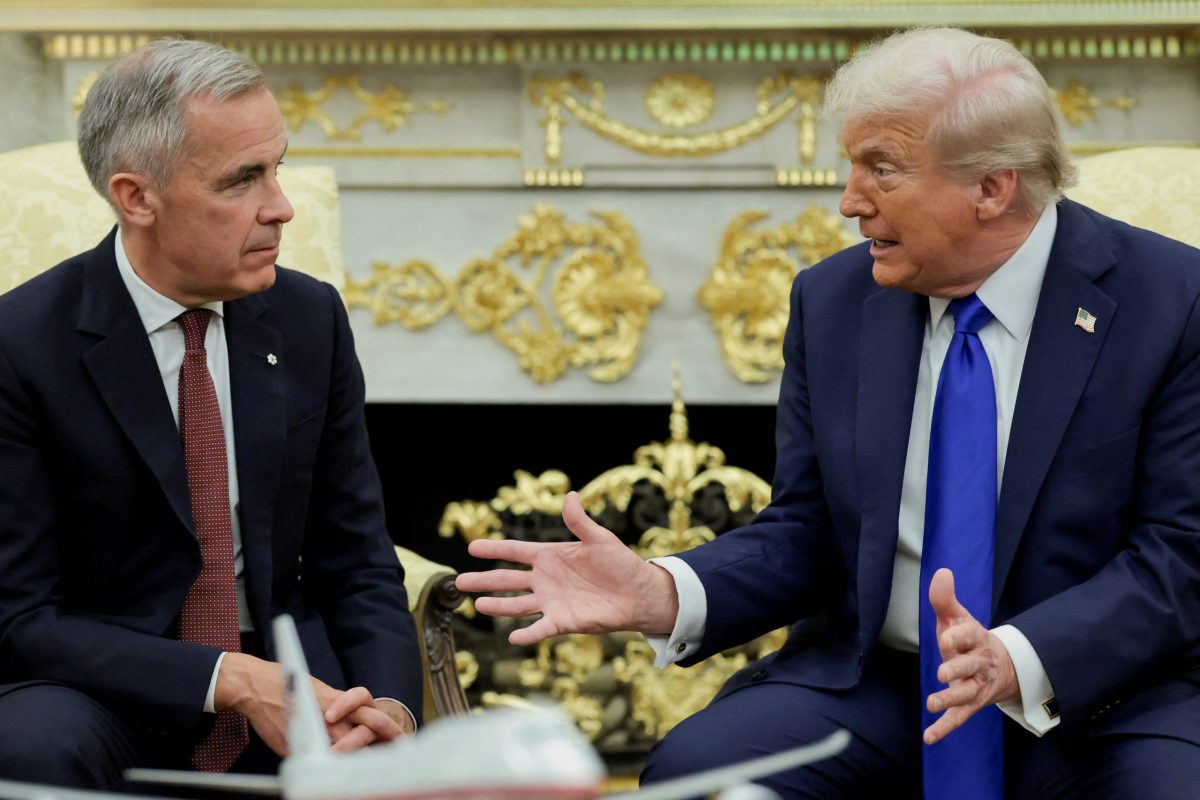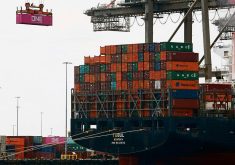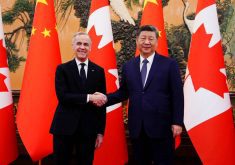Reuters — U.S. President Donald Trump intensified his criticism of Canada on Friday after terminating trade talks over a Canadian political advertisement that used Republican icon Ronald Reagan saying tariffs cause trade wars and economic disaster.
Trump, who imposed import tariffs on Canadian steel, aluminum and autos earlier this year, called the video ad fraudulent in a Truth Social post Thursday.
“Based on their egregious behavior, ALL TRADE NEGOTIATIONS WITH CANADA ARE HEREBY TERMINATED,” Trump wrote on Truth Social.
Canadian Prime Minister Mark Carney had removed most of Canada’s retaliatory tariffs on U.S. imports imposed by his predecessor, and the two sides have been in talks for weeks on a deal for the steel and aluminum sectors.
Read Also

U.S. grains: Chicago soybeans chop up and down as traders assess China demand
Soybean futures close mixed, wheat and corn higher on Thursday, Jan. 22.
On Friday, Trump accused Canada of trying to influence the U.S. Supreme Court as it prepares to hear arguments next month over the legality of Trump’s sweeping global tariffs.
In an early morning Truth Social post he also said former President Reagan embraced tariffs, but Reagan was a free market and free trade proponent.
Reagan voiceover criticises tariffs
Ontario Premier Doug Ford said this week that the ad from his provincial government, more than a week old, had caught the Republican president’s attention.
Ford has frequently urged Carney to take a more aggressive approach with Trump. Carney has visited Trump in the White House twice since becoming Prime Minister in March.
The ad’s voiceover consists of Reagan, a hero to many U.S. Republicans, criticizing tariffs on foreign goods while saying they cause job losses and trade wars.
“I heard that the president heard our ad. I’m sure he wasn’t too happy,” Ford said on Tuesday.
The Ronald Reagan Presidential Foundation said the ad used “selective audio and video”, and that it was examining legal options.
“The ad misrepresents the Presidential Radio Address (by Reagan in 1987), and the Government of Ontario did not seek nor receive permission to use and edit the remarks,” a Foundation statement said.
The video uses five complete sentences from the five-minute weekly address, spliced together out of sequence.
“When someone says, `Let’s impose tariffs on foreign imports,’ it looks like they’re doing the patriotic thing by protecting American products and jobs,” Reagan says. “And sometimes for a short while it works – but only for a short time.”
He also says: “…over the long run such trade barriers hurt every American worker and consumer”, and that the result of trade wars is that “Markets shrink and collapse; businesses and industries shut down; and millions of people lose their jobs.”
Trump has raised tariffs to highest since 1930s
The ad does not, however, mention that Reagan was using the address to explain that tariffs imposed on Japan by his administration should be seen as a sadly unavoidable exception to his basic belief in free trade as the key to prosperity.
The Canadian government had no immediate comment. Earlier on Thursday, Canada sharply reduced tariff-free import quotas for General Motors and Stellantis, citing their decisions to scale back manufacturing in the country.
Trump’s trade war has increased U.S. tariffs to their highest levels since the 1930s and he has regularly threatened more duties, sparking concerns among businesses and economists.
Carney told reporters on Thursday that Canada will not allow unfair U.S. access to its markets if talks on various trade deals with Washington fail.
Next year, the U.S., Canada and Mexico are due to review their 2020 continental free-trade agreement.
Carney comments
Speaking to reporters on the tarmac before departing to Kuala Lampur, Malaysia, Carney said cannot control U.S. trade policies, but that Canadian officials were working closely with their U.S. colleagues on “detailed, constructive, negotiations” on specific sectors, including steel, aluminum and energy.
“We stand ready to pick up on that progress and build on that progress when the Americans are ready to have those discussions,” said Carney, adding because it will be for the benefit of workers in the United States, workers in Canada and families in both of our countries.”
Carney also said Canada was focused on what it can control, including investing domestically and “developing new partnerships and opportunities, including with the economic giants of Asia, which is the focus of this trip.”
— Reporting by Kanishka Singh, Doina Chiacu, and Susan Heavey; Additional reporting by Phil Franz-Warkentin of Glaicer FarmMedia















